-
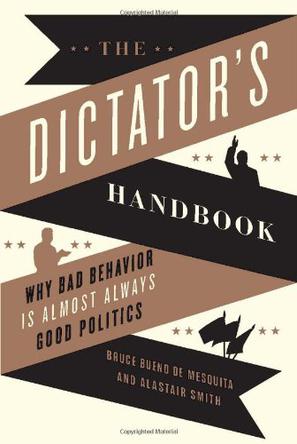
The Dictator's Handbook
In this title, two renowned political scientists make the contrarian, research-based case that - regardless of any other factors political scientists or historians may find relevant - the calculations and actions of rulers are the driving force of all politics, and the primary goal of rulers is to maintain power as long as possible. In this clever and accessible book, Bueno de Mesquita and Smith introduce us to their perspective of the political world. They bare the logic of politics, starting from the simple premise that leaders pursue their own ends, and that populations either have, or more often don't have, the power to constrain them to a significant degree. The book is organized by a series interconnected questions, among them: Why do leaders who wreck their countries keep their jobs for so long? Why do autocracies have dismal economic policies? How are there so many suffering people in resource-rich lands? Why do 'natural disasters' disproportionately strike poor nations? Why do 'evil-doers' so often collect loads of foreign aid? Why are democracies so good at war? In answering these questions, the authors look at politics, the choices of public policies, and even decisions about war and peace as lying outside of conventional thinking about culture and history. They set aside ideas of civic virtue and psychopathology. Such notions simply are not central to understanding what leaders do and why they do it. Instead, Bueno de Mesquita and Smith see politicians as self-interested louts, just the sort of people you wouldn't want to have over for dinner, but without whom you might not have dinner at all. And from this perspective, they are able to answer some perplexing mysteries of politics, shed light on what we read in the newspapers every single day, and offer realistic ways of improving human governance. -
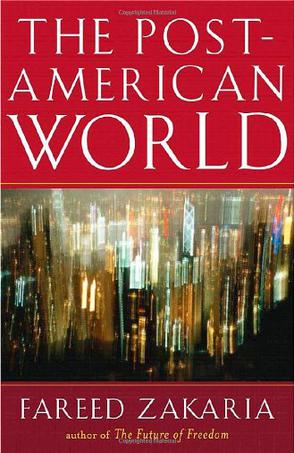
The Post-American World
"This is not a book about the decline of America, but rather about the rise of everyone else." So begins Fareed Zakaria's important new work on the era we are now entering. Following on the success of his best-selling The Future of Freedom, Zakaria describes with equal prescience a world in which the United States will no longer dominate the global economy, orchestrate geopolitics, or overwhelm cultures. He sees the "rise of the rest" the growth of countries like China, India, Brazil, Russia, and many others as the great story of our time, and one that will reshape the world. The tallest buildings, biggest dams, largest-selling movies, and most advanced cell phones are all being built outside the United States. This economic growth is producing political confidence, national pride, and potentially international problems. How should the United States understand and thrive in this rapidly changing international climate? What does it mean to live in a truly global era? Zakaria answers these questions with his customary lucidity, insight, and imagination. -
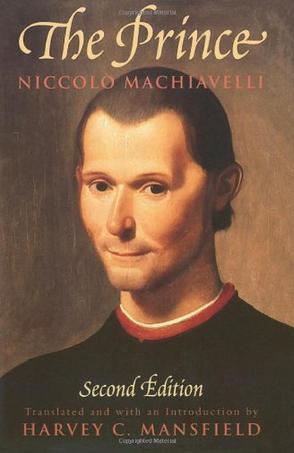
The Prince
Synopsis In his most famous work, THE PRINCE (Il Principe), Machiavelli described the ideal prince and encouraged the people of Italy to imagine what it might be like if such a person led a unified Italy. Written in 1513 and published posthumously in 1532, THE PRINCE has been interpreted both as a genuine handbook for potential rulers and as a satirical portrait of certain prevailing styles of leadership of the time. Instead of advocating a sense of moral obligation to one's constituents, Machiavelli believed that it is far better for a leader to be feared than liked. He believed that the ends justify the means, and deceit, ruthlessness, and greed are acceptable in the interest of maintaining power. Though THE PRINCE may have influenced Hitler and Mussolini, the Machiavellian principles outlined in it have earned the work a place on many, if not most, lists of required reading for government and political science courses. Size Length: 184 pages Height: 8.3 in. Width: 5.5 in. Thickness: 0.5 in. Weight: 7.2 oz. Publisher's Note The most famous book on politics ever written, The Prince remains as lively and as shocking today as when it was written almost five hundred years ago. Initially denounced as a collection of sinister maxims and as a recommendation of tyranny, it has more recently been defended and indeed applauded as the first scientific treatment of politics as it is rather than as it ought to be. A masterpiece of effective prose, The Prince is at once comic and formidable, imaginative and calculating, fascinating and chilling. Its influence in modern history has been profound, and -- often considered to be the first modern book -- it was surely a primary text for the modern philosophers who challenged the traditions of ancient and medieval thought and morality. Harvey C. Mansfield's translation brilliantly recreates the subtlety and terseness of Machiavelli's own prose while presenting an eminently readable text. Written in accessible and idiomatic English, it is the most literal and accurate translation available. In this second edition, Mansfield provides an analytic introduction, an updated bibliography, a chronology of Machiavelli's life, a map of Italy in his time, a substantial glossary, revisions to the translation itself, and Machiavelli's celebrated letter to Vettori in which he discusses The Prince. Mansfield's translation of this classic work, in combination with the new materials added for this edition, makes it the definitive version of The Prince, indispensable to scholars, students, and lovers of the dark art of politics. Industry reviews "If you're going into the trade or the business I'm in, Machiavelli's The Prince is the bible. You'd better read it, and you'd better reread it. The wisdom contained in that book stands you in good stead, for the nature of the public policy options that I exercise, and the techniques that are employed, and the assessment of your competition. I would recommend that to be read over, and over, and over, until death." Hon. Willie L. Brown Jr. An inexpensive but high quality translation of the classic Italian Renaissance statement of what has come to be called realpolitik. The translator, Paul Sonnino, presents an easily readable English but also takes care to render Italian words into English cognates or at least to use the same word consistently so the reader gets a sense of what terms and concepts Machiavelli repeated and in what context. Lightly annotated. Paper edition (unseen), $9.95. Annotation c. by Book News, Inc., Portland, Or. Reference & Research Book News (08/01/1996) An inexpensive but high quality translation of the classic Italian Renaissance statement of what has come to be called realpolitik. The translator, Paul Sonnino, presents an easily readable English but also takes care to render Italian words into English cognates or at least to use the same word consistently so the reader gets a sense of what terms and concepts Machiavelli repeated and in what context. Lightly annotated. Paper edition (unseen), $9.95. Annotation c. by Book News, Inc., Portland, Or. Reference & Research Book News (08/01/1996) -
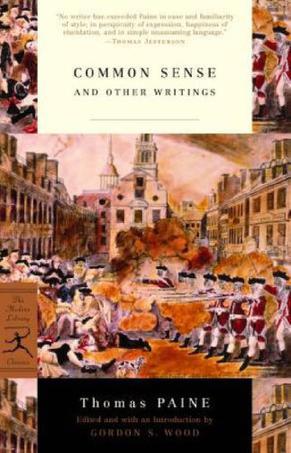
Common Sense and Other Writings
Includes the complete texts of Common Sense; Rights of Man, Part the Second; The Age of Reason (part one); Four Letters on Interesting Subjects , published anonymously and just discovered to be Paine’s work; and Letter to the Abbé Raynal, Paine’s first examination of world events; as well as selections from The American Crises In 1776, America was a hotbed of enlightenment and revolution. Thomas Paine not only spurred his fellow Americans to action but soon came to symbolize the spirit of the Revolution. His elegantly persuasive pieces spoke to the hearts and minds of those fighting for freedom. He was later outlawed in Britain, jailed in France, and finally labeled an atheist upon his return to America. -
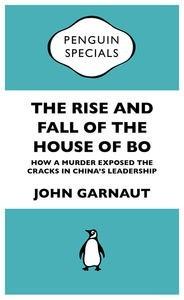
The Rise and Fall of the House of Bo
When news of the murder trial of prominent Communist Party leader Bo Xilai's wife reached Western attention, it was apparent that, as with many events in the secretive upper echelons of Chinese politics, there was more to the story. Now, as the Party's 18th National Congress oversees the biggest leadership transition in decades, and installs the Bo family's long-time rival Xi Jinping as president, China's rulers are finding it increasingly difficult to keep their poisonous internal divisions behind closed doors. Bo Xilai's breathtaking fall from grace is an extraordinary tale of excess, murder, defection, political purges and ideological clashes going back to Mao himself, as the princeling sons of the revolutionary heroes ascend to control of the Party. China watcher John Garnaut examines how Bo's stellar rise through the ranks troubled his more reformist peers, as he revived anti-'capitalist roader' sentiment, even while his family and associates enjoyed the more open economy's opportunities. Amid fears his imminent elevation to the powerful Standing Committee was leading China towards another destructive Cultural Revolution, have his opponents seized their chance now to destroy Bo and what he stands for? The trigger was his wife Gu Kailai's apparently paranoid murder of an English family friend, which exposed the corruption and brutality of Bo's outwardly successful administration of the massive city of Chongqing. It also led to the one of the highest-level attempted defections in Communist China's history when Bo's right-hand man, police chief Wang Lijun, tried to escape the ruins of his sponsor's reputation. Garnaut explains how this incredible glimpse into the very personal power struggles within the CCP exposes the myth of the unified one-party state. With China approaching superpower status, today's leadership shuffle may set the tone for international relations for decades. Here, Garnaut reveals a particularly Chinese spin on the old adage that the personal is political. -
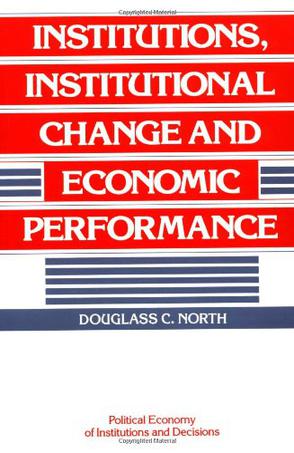
Institutions, Institutional Change and Economic Performance
Continuing his groundbreaking analysis of economic structures, Douglass North develops an analytical framework for explaining the ways in which institutions and institutional change affect the performance of economies, both at a given time and over time. Institutions exist, he argues, due to the uncertainties involved in human interaction; they are the constraints devised to structure that interaction. Yet, institutions vary widely in their consequences for economic performance; some economies develop institutions that produce growth and development, while others develop institutions that produce stagnation. North first explores the nature of institutions and explains the role of transaction and production costs in their development. The second part of the book deals with institutional change. Institutions create the incentive structure in an economy, and organisations will be created to take advantage of the opportunities provided within a given institutional framework. North argues that the kinds of skills and knowledge fostered by the structure of an economy will shape the direction of change and gradually alter the institutional framework. He then explains how institutional development may lead to a path-dependent pattern of development. In the final part of the book, North explains the implications of this analysis for economic theory and economic history. He indicates how institutional analysis must be incorporated into neo-classical theory and explores the potential for the construction of a dynamic theory of long-term economic change.